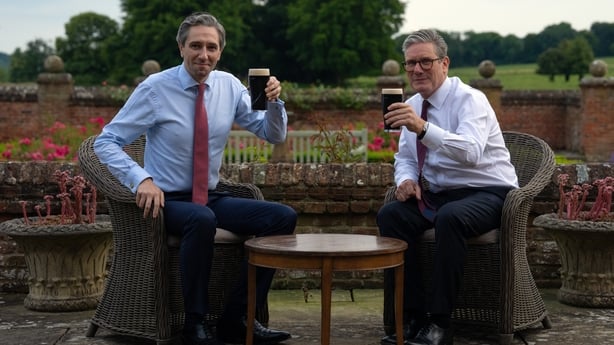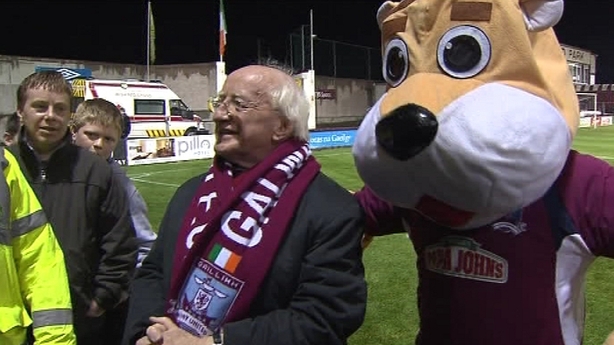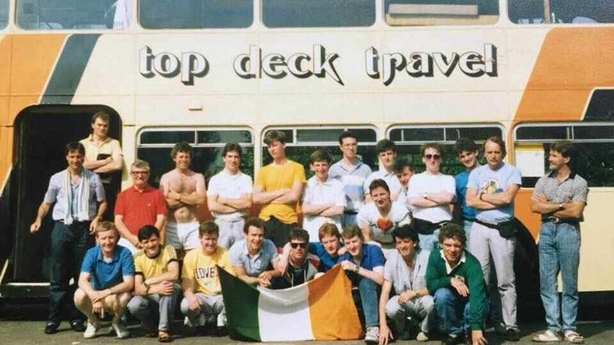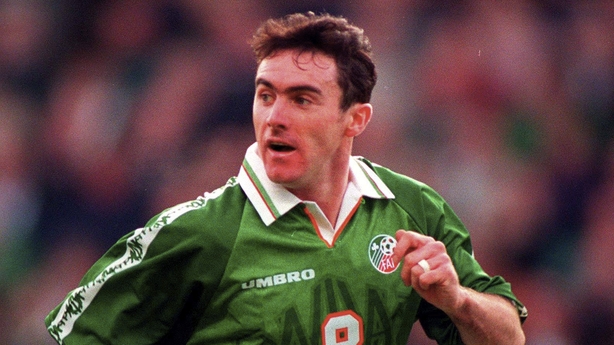The Taoiseach and the British Prime Minister will together make their way to the Aviva Stadium to watch Ireland take on England.
At first glance it is all rather simple.
Keir Starmer is the devoted Arsenal fan and dedicated football man, and Simon Harris is the young Taoiseach who remembers at least some of the national team's halcyon days.
"I know Italia 90 is most people’s football memory, but I was three-and-a-half when Packie Bonner made that save and have no recollection of it live. I’ve obviously since seen it dozens of times.
"My World Cup memories start with USA 1994, when I myself was a fully signed up player for Greystones United on D'Arcy’s field. I was a defender but once had to step in for an injured keeper, we lost 7-0.
"Ray Houghton’s goal and tumble celebration was the moment of the summer," the Taoiseach remembers.
So, there’s plenty there to keep the football talk flowing between Simon Harris and Keir Starmer this evening.
The fixture and the chats can all contribute to the healing of Anglo-Irish political relations after the bruising initial post-Brexit years.
It is part of what Mr Harris likes to call the "reset" of the Dublin-London relationship.

But Brexit and the resulting changes around work permits has had a fundamental impact on the sport the politicians will watch this evening.
Young Irish footballers can now only join British clubs when they reach the age of 18.
The decades old system which saw large number of young teenagers perfecting their skills at clubs in England and Scotland has been shut down.
This inevitably puts a focus on the lack of investment in the game domestically.
Those working on the ground point out that football consistently lags well behind the major funding set aside for horse and greyhound racing in every budget.
Writer and broadcaster Eamon Dunphy has likened football in Ireland to Cinderella, that is all glamour and glitz on big days like today, but typically left to fend for itself (notwithstanding the 2020 FAI bailout from Government) in a shabby garret.
Labour MEP Aodhán Ó Ríordáin believes it all stems from a residual feeling that the game is alien and foreign.
"During the first 50 years of the State, football was not embraced, and it has suffered for that. There remains little if any political warmth for it, apart from the occasional photo-op.
"There remains a widely held view politically that the League of Ireland is not reflective of society and culture, which is totally wrong," he said.

However, one prominent political figure who has always chartered a different course on this subject is President Michael D Higgins.
President Higgins will attend today’s game in the Aviva, but more tellingly is his continued attendance at many Galway United games, something he has done throughout his lengthy political career.
During that time, the international team had relied on two key pillars.
The development of young Irish players at English clubs and later, particularly under Jack Charlton, the recruitment of players with Irish ancestry.
The latter strategy is now also less straightforward and indeed the English FA have proved more adept in recent years at luring back English-born players, even if they initially declared for Ireland.
And so today, arguably the most influential player on the pitch will be England's Declan Rice.
He was once a senior Irish international before switching allegiances.
His change of heart did shock many in Irish football and there was even some informal political contact with his associates to see if he could remain wedded to the green of Ireland.
And that is before even mentioning Jack Grealish, the former Ireland under-21 star who played some Gaelic football in Croke Park as a youngster.
Then there is Lee Carsley, the well-respected England coach who played 40 times for Ireland and enjoyed a recent summer reunion with his extended family in Cork.
Does it all add a bristling edge to this fixture or is football something that ultimately brings people together?
The great Scottish sportswriter, Hugh Mcllvanney, often told readers that sport has be romantic or else it ceases to become a metaphor for war and becomes war.
Dan Mulhall, who was Irish ambassador in London when the Brexit referendum took place, largely shares this view, insisting that sport unites people.
There are, he says, more than 600,000 Irish-born people in Britain and their families hold a variety of views on Ireland, some are immersed in Irish culture while for others this holds little allure.
He predicts players of Irish-born parents in England will continue to take different views on the international team they choose to play for.
The man who remembers watching the 1966 England World Cup win with his grandmother recalls how that moment sparked his interest in English football.
Seven years later in October 1973 sitting in a pub in Cork, he would watch England miss out on qualifying for the 1974 World Cup after failing to defeat Poland.
"The pub erupted, there was shouting and joy, but then soon after there was the realisation that the World Cup would not be as interesting without England in it," he said.
Yes, it's complicated.

Fine Gael TD Frank Feighan offers an interesting view on this subject too.
He has in his time been co-chair of the British-Irish Parliamentary Assembly.
Perhaps even more pertinently he was part of a 22-man team that travelled and lived on a bus during Euro 88 in Germany, the high point of which was defeating England in Stuttgart.
The memories are he says "priceless".
He was a supporter too during those days in the early 1980s when it looked like Irish football would never have a glory day.
"Back then, I remember there were large numbers of people from the Republic of Ireland supporters' clubs from across Britain travelling to the games. They were far more organised and dedicated than us at the time," he said.
On the question of Declan Rice and Jack Grealish opting to play for England, he is philosophical.
"I wish them well. It is good that they played with us for a while and to feel angry about it is far too narrow and nationalistic," he said.

Indeed, it is not an easy path either way, as the late Alan McLoughlin, the man whose superb goal in Windsor Park secured Ireland’s place at the 1994 World Cup, revealed to readers in his memoir, A Different Shade of Green.
He wrote, "Occasionally, there’s a feeling of not being properly accepted by anyone: your accent marks you out in Ireland and your name marks out in England."
Therefore, the choice of which jersey to wear is often not straightforward, and in the end, it comes down to a player’s personal judgement.
As Edmund Burke, the Irish-born MP for Bristol, reminded his constituents in the 1770s, (ironically in a dispute over allowing free trade with Ireland) a person’s judgement cannot be sacrificed for local considerations.







